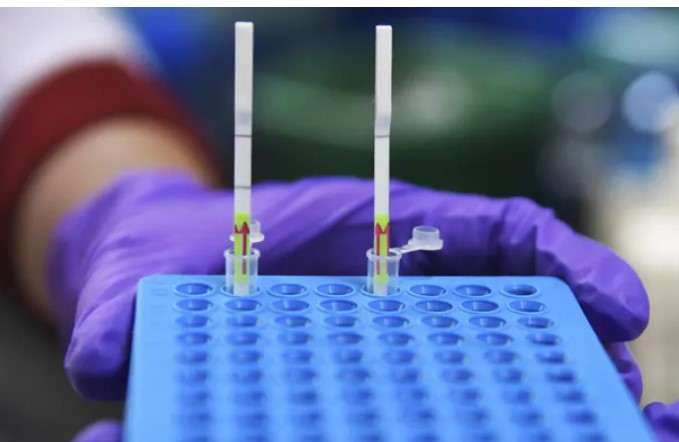
Delhi Minister Enforces Urgent Genome Sequencing Amidst Rising Concerns Over JN.1 Variant
Delhi Health Minister Saurabh Bharadwaj Understanding the JN.1 Variant of COVID-19
Delhi Health Minister Saurabh Bharadwaj has reaffirmed the directive for conducting genome sequencing on positive COVID cases to confirm the presence of the JN.1 variant. Speaking to Press Trust of India, he highlighted the government’s intensified COVID testing efforts, conducting 636 tests on Wednesday.
Mr. Bharadwaj confirmed Delhi’s first case of the JN.1 variant on Wednesday and emphasized the need for genome sequencing on all positive cases to identify new variants accurately. He reported that three variants were confirmed the previous day, with two belonging to the old Omicron variant and the new one identified as JN.1. Notably, the patient diagnosed with the JN.1 variant, a 52-year-old woman hospitalized due to mild concerns, has been discharged.
Providing updates, the minister mentioned that four patients are currently under hospital care, urging individuals experiencing prolonged illness to avoid crowded places. Additionally, he announced the issuance of directives to launch awareness campaigns in various public spaces, including bus stops.
Mr. Bharadwaj elaborated on the case of the JN.1 variant, stating that the patient in question, a 52-year-old woman, sought hospitalization out of precautionary concerns. Fortunately, she did not experience severe issues, and her subsequent discharge is a positive development.
Emphasizing public health measures, the minister urged individuals experiencing prolonged illness to steer clear of crowded places, contributing to efforts to curb the potential spread of COVID-19 variants. Recognizing the significance of proactive communication, he disclosed that directives have been issued to initiate awareness campaigns at prominent locations such as bus stops.
In the ongoing efforts to tackle the evolving situation, Mr. Bharadwaj underscored the importance of comprehensive testing and genomic surveillance. By reiterating the directive for genome sequencing on all positive cases, the government aims to swiftly identify and confirm the presence of new variants, facilitating timely responses and preventive measures.

The minister’s commitment to transparency and vigilance in the face of emerging variants reflects a proactive approach in managing the evolving COVID-19 landscape. As the situation unfolds, continued monitoring, testing, and public awareness initiatives remain integral components of the broader strategy to safeguard public health in Delhi.
As the global battle against the COVID-19 pandemic continues, a new variant has emerged, causing heightened concerns among health authorities and the public alike. Referred to as JN.1, this variant has recently surfaced, prompting intensified efforts for surveillance, research, and public health measures.
The Genesis of JN.1: JN.1 is the latest addition to the ever-evolving landscape of SARS-CoV-2 variants. Originating from the Omicron lineage, JN.1 raises questions about its transmissibility, severity, and potential impact on the efficacy of existing vaccines.
Genome Sequencing Mandate: In response to the emergence of JN.1, Delhi Health Minister Saurabh Bharadwaj has issued a directive mandating genome sequencing for all positive COVID-19 cases. This proactive measure aims to swiftly identify and confirm the presence of the JN.1 variant in delhi, allowing for a targeted and informed public health response.
Testing and Surveillance Intensified: The government’s ramped-up COVID testing efforts, with 636 tests conducted in a single day, exemplify the urgency and commitment to understanding the prevalence of JN.1. This increased surveillance serves as a critical tool in monitoring the variant’s spread and formulating effective containment strategies.

Confirmed Cases and Patient Profile: Delhi reported its first case of the JN.1 variant on Wednesday , involving a 52-year-old woman. Minister Bharadwaj shared that the patient, admitted to the hospital out of precaution, has since been discharged. Understanding the patient profile and the impact of the variant on individuals will be crucial in shaping future public health measures.
Challenges and Concerns: The emergence of new variants introduces uncertainties and challenges in the ongoing battle against the pandemic. Questions regarding the variant’s potential for increased transmissibility, vaccine resistance, and impact on disease severity remain at the forefront of scientific inquiries.
Public Health Measures and Awareness Campaigns: In light of the situation, Minister Bharadwaj has not only emphasized genome sequencing but has also urged individuals experiencing prolonged illness to avoid crowded places. Furthermore, directives have been issued to run awareness campaigns at bus stops and other public spaces, enhancing public understanding and adherence to safety protocols.
For the latest updates-click here.

